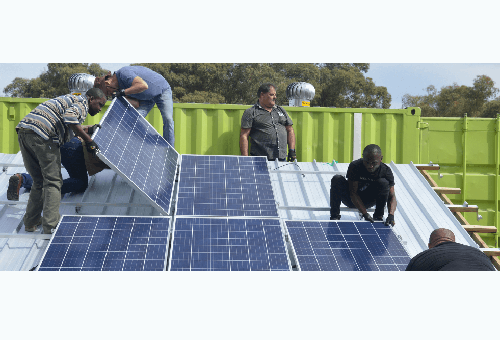Three new enterprises have used Development Bank of Namibia finance to strengthen their operations with solar energy. They include a truck and tractor repair plant in Gobabis, a charcoal manufacturer, also near Gobabis, and a large retail outlet in Okahandja. These changes were shared by the Development Bank of Namibia (DBN) executive of marketing Jerome Mutumba.
According to Mutumba, although DBN is associated with photovoltaic parks and larger solar electricity generators that feed into the grid, the bank also finances solar power installations for enterprises.
Mutumba pointed out that the spread of locations shows that solar installations can benefit businesses across Namibia.
In some cases, he said, a new connection to the grid may be prohibitively expensive, if the connection and the grid consumption costs are considered. In this case, the cost of renewable energy becomes economical in the medium to long term, with the initial cost written off against future savings and gains.
Mutumba went on to say that in the face of potential shortages in the Southern African Power Pool, and Namibia’s reliance on electricity imports, independent power generation for own consumption becomes an attractive form of security for business continuity – whether the business is grid reliant or not.
The trend towards own generation by the Namibian private sector, through solar power, Mutumba observed, has become more prevalent, with widely reported capacity installed by large retail facilities and fuel outlets. This is also in line with new approaches in environmental and social governance (ESG).
In addition, own generation by businesses alleviates the burden on the national grid, making electricity available for household consumption and enterprises that are not able to establish their solar generation.
Developmentally, the net impact, Mutumba pointed out, is beneficial with greater enterprise security directly linked to the preservation of employment.
The next frontier in the field of solar generation, he added, is an installation in affordable housing developments, taking the form of solar water heating and/or generation for household use.
Although the initial cost will be passed on to the owner of the new home, the increment in cost has the medium to long-term effect of making home ownership more affordable monthly.
On the topic of how the Bank can finance solar generation, Mutumba said that the Bank provides finance under multiple sectoral facilities, including tourism, retail and wholesale, manufacturing and transport and logistics. It can also be financed as an addition to affordable housing developments.
He also said the bank’s KfW-supported recovery loan may also be a source of finance. The loan, which has a duration of 32 months or less, has a fixed interest rate of 5 925% but no interest is levied for the first 12 months of the loan.
Although the loan has a short duration, enterprises that have reserves and are in a position to repay faster are encouraged to consider the opportunity.
“If businesses benefit from solar, we have a duty to support it and add it to our operational sustainability,” Mutumba concluded.


